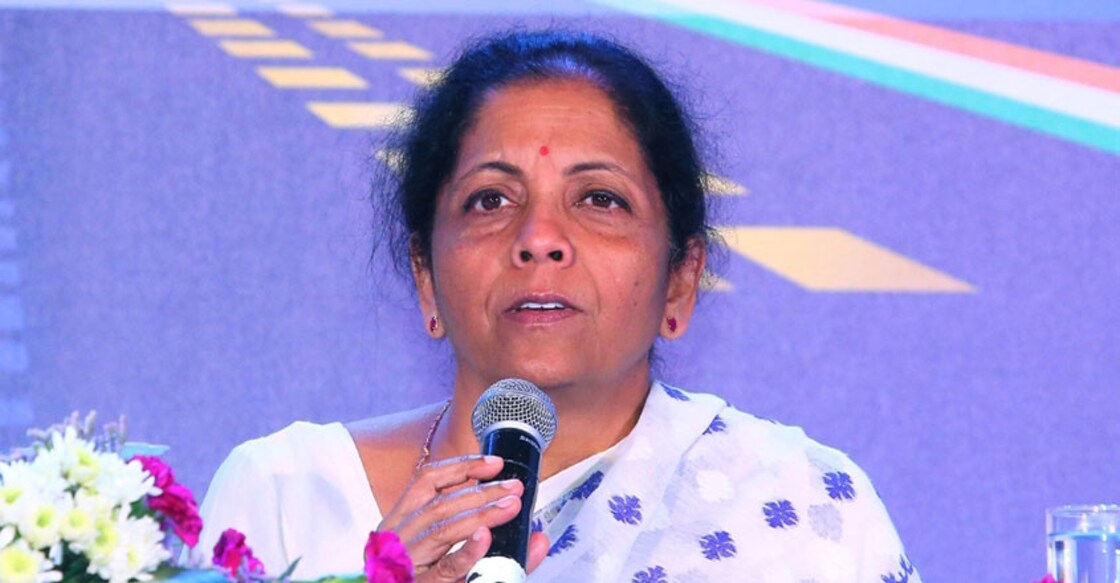Sitharaman plays inflation card to dispel fears of economic gloom

Mail This Article
Amidst rising fears that the Indian economy is on a downhill journey, Finance Minister Nirmala Sitharaman on Friday said inflation is completely under control and that it has not risen since 2014. The Indian economy had recorded its lowest growth rate- 5 per cent- in five years in the first quarter of F20.
"Inflation is absolutely under control. Nobody can question our government on inflation. Inflation has not risen since 2014. It was up during 2009-14 (during the UPA-II). The price rise was in two digits for commodities during that period", she said after interaction with industry and tax officials here in her continuing series of meetings with stakeholders.
India's retail inflation rate eased slightly in July, staying below the central bank's 4 per cent medium-term target for a 12th straight month, strengthening views that there will be a policy rate cut in October.
Annual retail inflation in July was 3.15 per cent, down from an eight-month high of 3.18 per cent in June. The country is currently reeling under a slowdown which is being debated as both cyclical and structural. There have been demands for RBI to further cut rates to push growth, scale up consumption and demand. Low inflation is a key pre-requisite for RBI to cut further interest rates.
Retail food prices, which make up nearly half of India's inflation basket, increased 2.36 per cent in July from a year earlier, compared with an upwardly revised 2.25 per cent in June. Food prices are likely to remain subdued after a pick-up in rainfall in several parts of the country, which will boost crops. Core consumer inflation, which strips out food and fuel prices, was estimated between 4.47 per cent and 4.6 per cent in July, above 4.09 per cent to 4.11 per cent in June, according to two analysts who estimated inflation figures released on Tuesday.
Retail inflation in India has eased sharply since November 2013 peak of 12.17 per cent due to fall in prices of food and oil, as well as sluggish domestic consumer demand. Low inflation helped Prime Minister Narendra Modi win a second term in a landslide election victory in May.
While low inflation is helping the economy, declining farm incomes and record high unemployment have hit consumer demand and economic growth. The government is worried about declines in private investment and a manufacturing slowdown, particularly the auto sector, which pulled the annual economic growth pace to a five-year low of 5.8 per cent in January-March.
Separately, figures showed industrial output increased 2 per cent in June from a year earlier.
PSEs asked to stick to capex plan
The Finance Ministry on Friday met heads of the Central Public Sector Enterprises (CPSEs) in an effort to boost capital expenditure and ensure quick payment to the vendors to infuse liquidity in the market.
The heads of Maharatna and Navratna Central Public Sector Enterprises (CPSEs) and Financial Advisors (FAs) of infrastructure Ministries attended the meeting.
The meeting was co-chaired by Atanu Chakraborty, Secretary, Department of Economic Affairs, and G.C. Murmu, Secretary Department of Expenditure, an official statement said.
The Ministry and the CPSEs reviewed three areas: Capital expenditure by various CPSEs and ministries where the CPSEs were asked adhere to the expenditure plan and accelerate investment activities. The meeting reviewed release of payments for procurements and other contracts without delay so as to infuse liquidity in a time-bound manner. The hour-long meeting also focused on resolution of outstanding payments which may have been held up on account of disputes.
During last week, the Secretary (Expenditure) and Secretary (Economic Affairs) also co-chaired a meeting with the heads of large CPSEs and officials of the Ministry of Micro, Small and Medium Enterprises and the Ministry of Public Enterprises. The government has devised a multi-pronged approachfor providing boost to the economy.
Merger of some Public Sector Banks and upfront capital infusion of Rs 70,000 crore were announced recently. It is hoped that enhanced credit flow will spur investment cycle and help revive stressed sectors such as housing.
Start-ups have been exempt from 'angel tax'. Distress in the auto sector has also been addressed through a package of measures.
The statement said the Ministry of Finance would constantly monitor the progress of large infrastructure projects for the Ministries as well as the CPSEs and further follow-up meetings would be held. The Ministry will be developing a dashboard for enabling Ministries to upload figures on periodic basis.
The meeting was attended by CMD PGCIL, Director projects, NTPC, Member, Finance NHAI, Director Finance ONGC and SAIL, CEO of GeM and additonal member of Finance of Railways. FAs of Railways, health and family welfare, petroleum and naural gas, road transport and highways, shipping, power, civil aviation, housing and urban affairs, water resources, rural developement and HRD attended the meeting.
(With inputs from IANS.)

